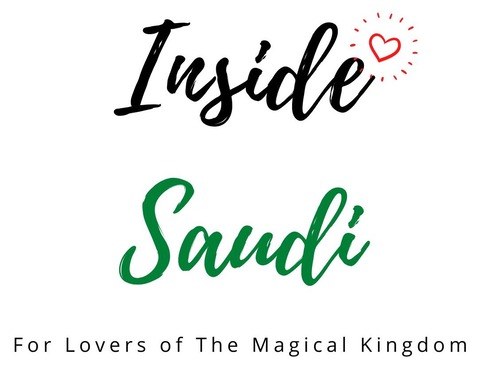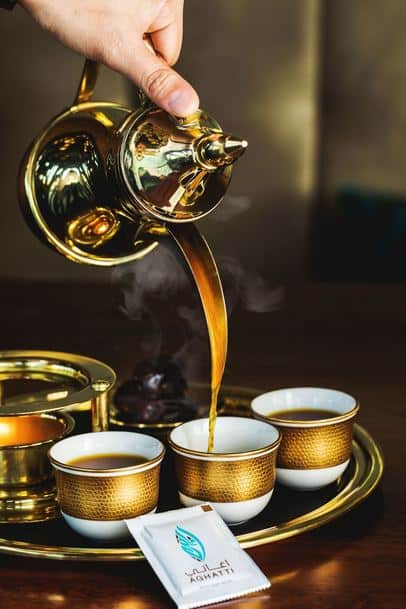
I love visiting Saudi homes. The host likes to make such a fuss of their guests. For a short time, I know what it feels like to be a king. They way they invite you in with such enthusiasm, the endless flow of delicious sweets and Arabic coffee makes you feel utterly welcome in their homes.
For most Saudis, entertaining guests with food and Arabic coffee is a passion, a time-honored tradition and a kind of mini celebration.
You can see the delight on their faces as they usher you into their Majlis, sit you down on the floor or in the most comfortable seat, welcome you profusely and serve you endless cups of coffee.
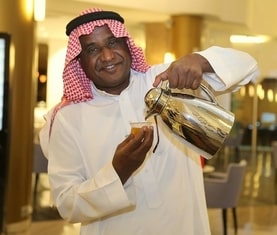
At first, I could not understand this custom. It seemed kind of odd to me, sort of theatrical. However, for a Saudi family, it is a genuine pleasure, almost an obligation and a channel for the expression of kindness and feelings of respect for friends and guests.
Sadly, this kind of formality is not something I have not experienced at all in the UK or in other European countries.
This article will tell you everything you need to know about Saudi Arabic coffee. It discusses what Arabic coffee is, the history, the custom, the types, how to buy it, store, prepare and serve it. It also tells you who drinks it and when. Finally, the health benefits are considered.
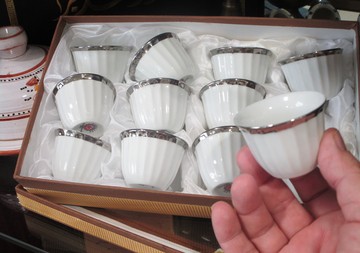
I have enjoyed Arabic coffee in Saudi homes for many years, but I had no idea what it is or how it is prepared. So recently, I went to the local coffee and spice market to ask and a good Saudi friend showed me step by step how to prepare it. Actually, I found that it is very easy indeed.
So what is Saudi Arabic coffee? Arabic coffee (Qahwa Arabia) is a hot brew made from Coffea arabica beans. It is grown at 1,000 to 2,000m and is originally from Yemen. It is light to dark in color, tastes plain or spicy/bitter and is served in tiny decorative cups called (finjen). Saudi families drink it together and it is served to guests with dates, cakes, and sweets.
Saudi Arabic Coffee – The Facts
Etymology and History Of Arabic Coffee (Qahwa Arabia)?

The word coffee in English derives from the Arabic word Qahwa itself possibly from the word قَهِيَ, or qahiya meaning ‘to suppress hunger’ or the word qahh meaning dark in color.
The coffee bean (berry) you buy in the shop before it is ground in is called bunn in Arabic and not qahwa. It only takes the name when it is prepared for drinking.
The first reference in history to the coffee tree and drinking coffee can be traced back to Yemen known then as Arabia Felix in the 15th century. The Sufi practitioners drank it in order to stay awake for qiyam or late-night prayers and devotions.

The practice of drinking coffee later spread north to Mecca and Madinah, then onto the larger cities in the Muslim empire by the Hajj pilgrims returning back to their home countries. The Islamic authorities in Mecca banned its use in 1511 and in Cairo, Egypt in 1532 because of its invigorating effect. Years after the bans were overturned.
Later, from the Middle East and Turkey, coffee drinking spread to Europe and the English speaking world.
The Ingredients In Arabic Coffee

It contains boiled water, finely ground coffee beans (Bunn), ground cardamoms, no sugar, and saffron and/or cloves can be added.
The Taste Of Arabic Coffee
It tastes hot, spicy/bitter, and a little grainy. The stimulating quality of taste and color depends on its type, freshness, the way of roasting the beans, brewing time and of course, the spices you add.
| Roast Type | Temperature |
| Light | 165°C (329°F) |
| Dark | 210°C (410°F |
| Color | Time |
| Light | 10 mins |
| Dark | 30 mins |
The Kinds Of Arabic Coffee

World wide, there are two main coffee types; Robusta and Coffea Arabica. The first is used to make instant coffee and the second account is used in about 60 to 70% of the coffee industry.
Coffee beans from a number of countries are available in Saudi Arabia including Brazil, Colombia, and Africa. However, most popularly sold coffee beans are those from Ethiopia and Yemen.
Way To Serve Arabic Coffee

Saudis drink it by pouring it from an Arabic Coffee pot (Dallah) into a tiny handleless cup called a (Finjal). It is enjoyed either in family gatherings or socially with friends and guests in a Majis, a large, comfortably seated guest outhouse located in the front yard of the home.
Saudis also love to prepare Arabic coffee in the house each day and bring it to work or the office in an elegant thermos flask to share with colleagues or visitors with dates, sweets, and delicacies.
Who Drinks Arabic Coffee And When
In the kingdom, Saudis, Arabs, and Turkish nationals prefer to drink Arabic coffee whilst the Indians and Asians enjoy sweet, milkless brown tea (chai).
Arabic coffee (Qahwa Arabia) can be consumed at any time of the day. The Saudis and Arabs like it in the late afternoon and evening. They drink it in the Majlis when visiting friends or after lunch to help stay awake or before traveling a long distance when driving a car.
Starbucks and branded coffee houses chains serving cappuccino and lattes etc. are very popular with older and younger Saudi women.
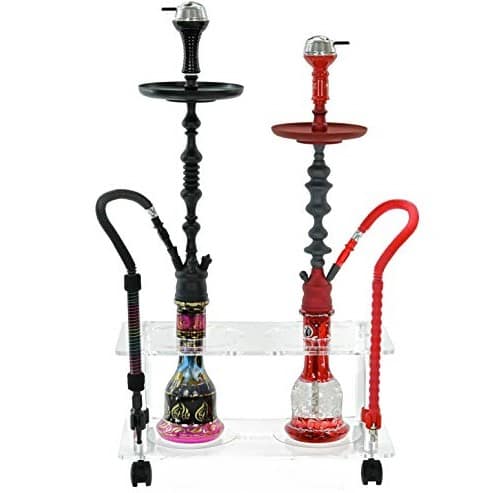
However, young Saudi men prefer to meet in traditionally built and decorated coffee houses where they can hang out, play cards and games, drink Arabic coffee (Qahwa Arabia) and smoke the increasingly popular water pipe called a hookah or shisha.
Buying Arabic Coffee -The Cost
In Saudi Arabia and in the Arab world in general, Arabic coffee beans can be prepared at home or bought ready for brewing from the Herbalists or the (Attar). These small shops sell coffee beans, herbs, and spices, sweets, biscuits, dates, soaps, shampoos and beauty products.
In Saudi Arabia, the traditional (Attar) can be found next to major supermarkets, in street markets, Malls, and popular shopping venues.
In the past, roasting, cooking and preparing the raw coffee beans (bunn) was done in the home. Some people still follow this tradition and consider it an important custom or as a pleasurable pastime.
However, the majority of Saudis today buy pre-roasted coffee beans at the (Attar) and have them ground to a very fine powder on the spot by automated grinding machines especially if they like to drink plain coffee (Qahwa Sedaa).
Most people though, like to add ground cardamon with the coffee powder to make a delicious spicy mix. Cloves, saffron, and cinnamon can be added later according to drinking preferences.
The Coffee Beans Used For Arabic Coffee

Saudi people love to buy two popular brands of coffee beans in the (Attar). The cheapest and most available is from Ethiopia and the most expensive is from Yemen.
| Coffee Origin | Type | Price Per Kilo |
| Ethiopia | Husks and beans | SR 25-35 |
| Yemen | Beans | SR 35-55 |
| Cardamon | SR 200 |
You can buy ground coffee or cardamon by the kilo or in lesser amounts of 100 grams. The Attar grinds, mixes and bags your coffee powder on the spot and charges you according to the amount of powder you buy.
Finely ground coffee powder mixes are used very quickly in Saudi homes and are rarely stored for extended periods.
How To Make And Prepare Saudi Arabic Coffee
I am often invited by Saudi friends to drink Arabic coffee with them in their homes or at work. When I ask them how they make it, they reply, “Oh, it is easy.’’ or “I am not sure, my wife makes it”.
So one day, I decided to ask an experienced coffee maker and on this particular occasion, he showed me the way step by step in the kitchen.
So, how do you actually make Saudi Arabic coffee? First, you take two heaped tablespoons of freshly ground coffee powder mix and add it to cold or hot water in a pan or dallah on a low heat. Then, slowly boil the mix. After that, simmer for a minimum of 10 minutes. Later, add a pinch of saffron, and/or cloves or cinnamon. Finally, tip the hot coffee into a Dallah or thermos flask and serve.
Cooking for longer will make the coffee darker and stronger. People in the Western and Central regions of the kingdom prefer lighter, golden almost transparent brews. People from the north cook their coffee for up to an hour sometimes preferring darker, stronger more bitter, spicier brews.
Do this and you will have a great Arabic coffee. There is no need to filter.
Things You Need To Have Ready To Make Arabic Coffee
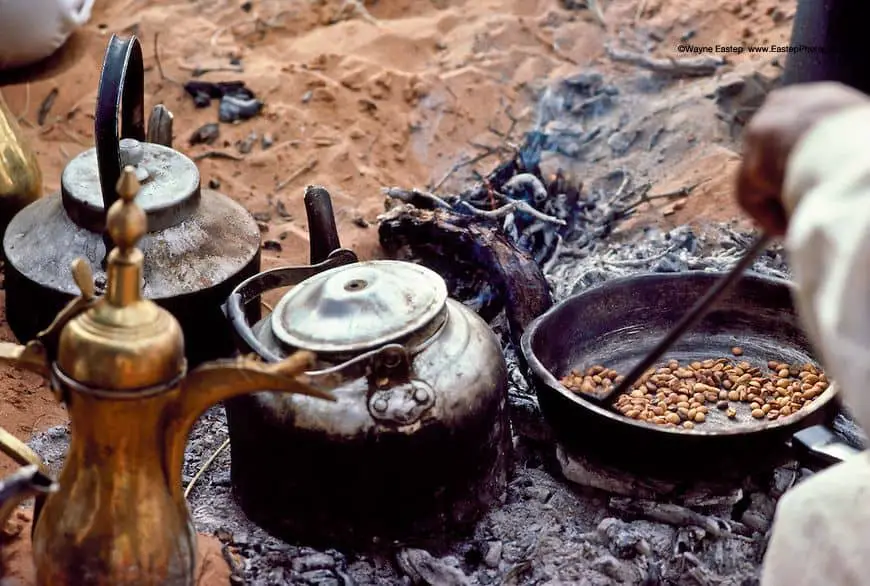
- Kitchen Stove or Outdoor Stove and Coals
- Electric Arabic Coffee Maker (Optional)
- Quality Coffee Grinder or Mortar & Pestle
- Pot or Pan for Cooking
- Large Wooden Spoon
- Dish Cloths
- Tray/Cups (Finjan) or Small Glasses
- Small Bowl of Water to Wash Used Cups
- A Careful Eye and Steady Pouring Hand
Some Best Fresh Coffee Preparation Tips
- Buy good quality coffee beans (Bunn)
- Grind the coffee beans/cardamom to a fine grade
- Use only a freshly ground powder mix
- Cardamom, Saffron, Cloves, and Cinnamon as required
- Cook for more than ten minutes to increase the strength and color
- Only simmer not over boil the coffee
- Let the coffee residue sink before serving
- Don’t add sugar or milk
Best Ways To Store Arabic Coffee Powder
To maintain its freshness, you can store Arabic coffee in a sealed container for up to 2-3 months. If you wish to keep it for longer, seal it and keep it in the refrigerator cooler and NOT the freezer compartment. This way, it can stay fresh for months at a time.
Best Saffron To Use in Arabic Coffee

(High-Grade Floats-Low Grade Sinks-My Test)
In Saudi Arabia, the Attar sells two brands of Saffron (Zafran); Iranian and Spanish. The first is the cheapest and the most common. The second has better quality and is more expensive.
There is a quality, rather more superior Moroccan brand that is slightly more expensive than Spanish saffron.
It is not normally available at the Attar but excellent quality Moroccan can saffron be bought online in Saudi Arabia at the following Instagram link . Click here for a wonderful, quality and (I know) discounted prices.
. Click here for a wonderful, quality and (I know) discounted prices.
| Saffron Origin | Grade | Price Per Gram |
| Iran | Standard | SR 8-10 |
| Spain | Medium/Good | SR 10-15 |
| Morocco | Superior | SR 15-20 |
The Real Benefits Of Drinking Arabic Coffee

There are many and some are commonly well known and others not so much. There are lots of studies and evidence proving the tangible benefits of drinking coffee.
Health Benefits:
- Is Calorie-Free
- Low In Caffeine
- Contains Lots of Antioxidants (Vitamin E)
- Protects Against Infections and Diseases
- Keeps You Hydrated
- Relieves Mental and Bodily Fatigue
- Reduces Blood Pressure
- Maintains Stamina
- Makes You Relaxed, Alert And Happy
Disease Prevention:
- Diabetes
- Parkinson’s
- Alzheimer’s
- Dementia
- Cognitive Decline
- Gallstones
- Gout
- Type 2 Diabetes
- Some Cancers
How Coffee Is Used To Treat Cancer

Coffee is used routinely to treat cancer patients as enemas administered rectally in a treatment known as Gerson Therapy.
Caffeinated coffee is piped rectally in cancer patients each day, every four hours and they are given a special diet of liver, a variety of vegetables and other beneficial supplements.
Arabic Coffee -Its Social, Cultural and Spiritual Importance

Coffee is prepared in the kitchen or in front of family and guests. Sometimes, in a traditional environment, the coffee beans are roasted on an open fire, pounded and ground in a ceramic or copper mortar and pestle.
Making and serving Arabic coffee (Qahwa Arabia) is a major act of hospitality in Saudi culture and a great show of kindness and community.
Then, the mashed coffee grounds are added to a large pot of water, boiled, brewed and spices are added. To serve guests, the hot coffee is poured, unfiltered and sometimes through a palm tree fibers inserted into the spout of a special Arabic coffee pot (Dallah).
Guests are served Arabic coffee in tiny coffee cups called (finjen) and only filled halfway. This allows guests to drink their coffee quickly and for the coffee server usually the eldest son of the family to replenish the guests, two or three more times.
Arabic coffee can be drunk in the home or in the Majlis outhouse in the presence of the eldest male members of the family (Shaikhs), fathers, children, and grandchildren. Relatives and extended family members come and go and use the Majlis as the meeting place and focal area for socializing and chatting.
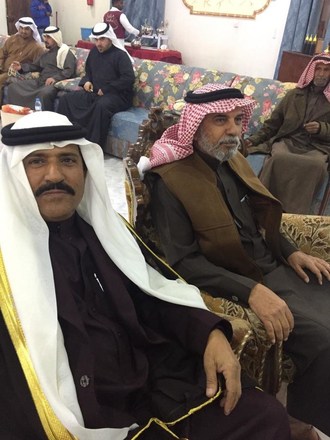
Bedouin people sit directly on the floor, their backs supported by cushions or comfortable low seating arrangements with small side tables for cups, dates, sweets, and cakes. They too own and run the shops (Attar) where coffee beans and spices are bought and sold.
When the guest drinks enough Arabic coffee, he places his hand over the mouth of the cup, (finjal) and shakes it from side to side to indicate that he has drunk enough.
The custom for making and drinking Arabic coffee is the same for women who usually meet together inside the home or special area reserved for female family members.
Related Questions
How is Arabic Coffee (Qahwa Arabia) different from Turkish Coffee? Arabic coffee is lighter in color, less viscous and made with cardamom. Turkish coffee is much thicker and black, can be sweetened and is drunk in small ceramic cups and saucers.
Is There A Modern Way To Make Arabic Coffee? Yes, the electric Arabic Coffee Maker for the home or the workplace conveniently makes the finest most delicious Arabic coffee and the larger models can make up to 7 liters. It keeps the coffee warm for up to 6 hours and alerts the user when to add cardamom, saffron, and/or spices.
Click this link to see my recommended electric Arabic coffee maker.
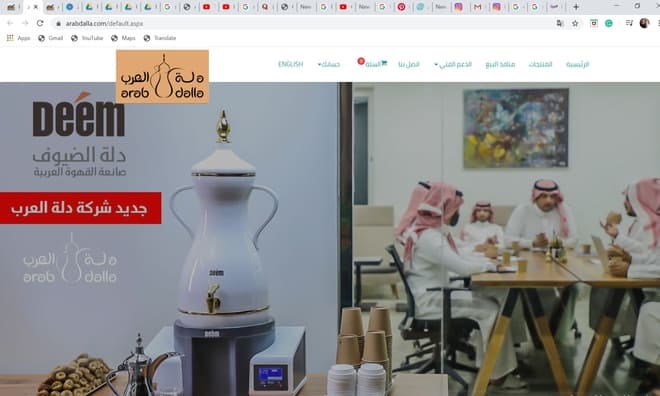
Deem New Electric Arabic Coffee Makers For Home and Work
